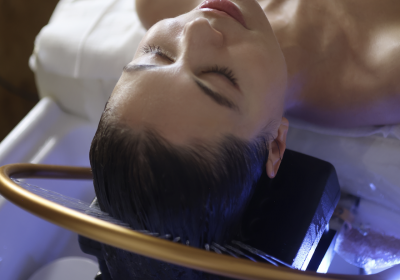What is stress? Stress is the body's natural defence against predators and danger and by definition is quite a healthy response to challenging life situations. However, when instead of dealing with predators we are getting stressed about minor events at work or home on a daily basis, the stress then becomes systemic and starts to affect our health by causing tight neck and shoulders, digestive issues such as bloating, IBS, reflux or ulcers, heart disease or mood disorders. In fact stress is the precursor of most chronic conditions and while we can not always change the source of stress there is a lot we can do to change our reaction to it and reduce its impact on our bodies.
Below are few simple but powerful tips on stress reduction, implementing even three or four of the protocols below can significantly improve the quality of your life.
1. Honor your body’s need for rest
Rest is essential to life. Your body works so hard for you all day every day, you need to give back and give it some time to replenish. Recognise and accept you limitations and make sure if you come close to burnout, you never cross that line and give yourself sufficient rest immediately to restore your vitality.
2. Put yourself first
It might sound like a cliché, but you need to look after yourself in order to achieve your life’s goals. Whether kids, marriage or job is your priority, keeping yourself in good physical and emotional shape will allow you to be the best at all of those roles. Be selective about what you take on and say no to things that will unnecessarily add to your load.
3. Stick with light exercises
Do not push yourself too far and exceed the limits of your energy. Physical activities during stressful times should be focused on light exercises such as yoga, Qi Gong, Tai Chi, walking or jogging.
4. Benefit from calming herbal teas
Do not over estimate the power of a high quality herbal tea with herbs such as chamomile, passion flower, oat straw, lemon balm, St. John’s Wort, vervain or skullcap. These herbs have been used for centuries to combat stress, calm nervous anxiety, boost endorphins and support restful sleep.
Make sure you source them from a good supplier and infuse 1 tablespoon over 10 minutes in a pot of hot water or even overnight to achieve the best results.
5. Practice acceptance and gratitude
Accept your limitations, allow yourself to do nothing from time to time. Love yourself when you are tired, sad, angry or bloated. There is an inner critic inside of us trying to keep us small and safe. The downside is this also stops us from living a full life. Find your happy place. Where’s the one place you feel totally at ease, calm, happy, positive, high on life? Go to that place when you are going through hard times, or imagine yourself being there. Think about how it feels, what it smells like, what it looks like.
Celebrate your wins no matter how big or small. Find something to be grateful for every day. It’s inevitable that you are going to have your down days. This is fine and very human. It’s especially important on these days to find at least one thing you are grateful for as it helps to shift your mind and energy around what’s going on.
6. Find a mindful activity that supports your emotional, physical and mental balance
There are many ways of increasing mindfulness, including Qigong, reiki, earthing, breathing exercises, forest bathing, yoga and meditation. It can be as simple as going for a walk, taking a relaxing bath or listening to singing bowls. It has to be enjoyable and easy to incorporate into your daily routine.
Researchers have documented the benefits of a regular practice of simple, deep breathing which include reduced anxiety and depression, stronger immunity, lower/stabilized blood pressure, increased energy levels, muscle relaxation, decreased feelings of stress and mental exhaustion. In addition, breathing can have an immediate effect on diffusing emotional energy, so there is less reactivity to our emotions. When you breathe deeply and slowly, you activate the parasympathetic nervous system, which reverses the stress response in your body.
7. Self massage
Self-massage of the body with warm sesame or coconut oil and then leaving the oil on the skin for 15 minutes every day before a bath or shower
improves the skin, tones muscles and blood vessels, and has a soothing effect on the nervous system. If short of time, you can simply drop a little sesame oil in your ears and massage the neck, head, spine and soles of the feet. Even done three times a week, an oil-massage will have a beneficial effect, particularly for stress.
8. Enjoy yourself
Participating in activities that you genuinely enjoy will release dopamine, the feel-good chemical in the brain. Cuddling, kissing, hugging and sex can all help relieve stress. Positive physical contact can help release our happy hormone - oxytocin and lower our stress hormone - cortisol. This can help lower blood pressure and heart rate, both of which are physical symptoms of stress.
9. Sleep Hygiene
Establishing healthy sleep hygiene can significantly improve our quality of life, restore our body’s emotional and physical energy and aid recovery from stress.
Avoid/limit any stimulants in the evening Caffeine and alcohol both disrupt sleep. While alcohol may make you drowsy and induce sleep initially, it disrupts your sleep in the latter part of the night – preventing you from getting essential amounts of REM and deep sleep. On the flip side, caffeine is a stimulant.
Start going to sleep around 10pm when melatonin production starts to rise Melatonin is a natural sleep hormone made by your body's pineal gland. During the day the pineal is inactive. When the sun goes down and darkness occurs, the pineal is "turned on" by the SCN and begins to actively produce melatonin, which is released into the blood. Usually, this occurs around 10 pm. If you fall asleep after 2am, you would have missed the peak in melatonin production, which would affect the quality of your sleep.
Factors inversely affecting melatonin production: age, shift work, alcohol consumption, evening exercise, caffeine, pharmacologic agents such as antidepressants, beta-blockers, non-steroidal anti- inflammatory drugs (NSAIDs). Keep a diary (document diet, exercise, stress levels). Everyone is individual, you will need to find out what factors make your sleep better or worse.
Additionally, melatonin is a naturally occurring anti-oxidant and protects against DNA damage acting as a scavenger of free radicals, so don’t miss out on its anti-aging effect amongst other benefits!
Establish a regular relaxing bedtime routine.
A regular nightly routine helps the body recognize that it is bedtime. This could include taking warm relaxing bath with essential oils or Epson salt, reading a book, meditating, listening to reiki music or doing breathing exercises.
One of the best Ayurvedic recipes that helps to reduce inflammation, wind down, reduces stress and promotes restful sleep is Golden milk with Ashwagandha.
INGREDIENTS
- 1 cup milk, or unsweetened non-dairy milk
- 1 tsp ashwagandha powder
- 1/2 tsp cinnamon powder
- 1 tsp turmeric powder
- 1 (1/2-inch) piece of organic ginger unpeeled, thinly sliced
- pinch of black pepper (increases bioavailability or turmeric)
PREPARATION
- Whisk milk, or non-dairy milk, cinnamon, turmeric, ginger, pepper, and ashwagandha in a small saucepan; bring to a low boil. Reduce heat and simmer for about 5 minutes. Alternatively use milk frother to whisk the milk and mix the powder into it. (Best non-dairy milk for frothing is Oatly Oat Drink Barrista Edition)
- Making sure you have a restful sleep in a pleasant environment. Mattress and pillows should be comfortable. The bedroom should be cool – between 16C and 19C degrees – for optimal sleep. Consider using blackout curtains, eye shades, ear plugs, "white noise" machines, humidifiers and other devices that can make the bedroom more relaxing.
Following these many recommendations can already be stressful. Pick the ones that are easier for you to implement and add gradually. It would be more beneficial to devote even 15 mins a day to yourself than delaying until you find time and energy.
Jenya Di Pierro
Herbal Medicine Practitioner, BA, MA, AMH, ANP
@JENYADIPIERRO

Tags: Health | Author: Jenya Di Pierro, Herbalist & Naturopath



